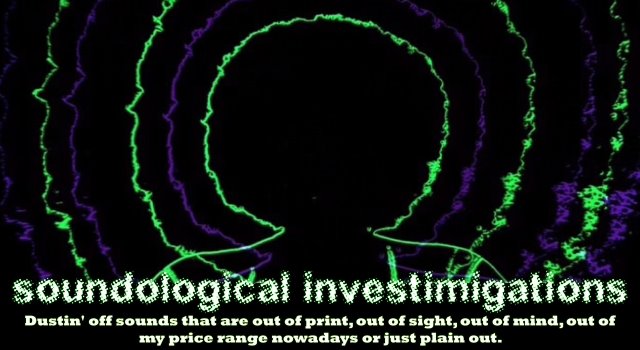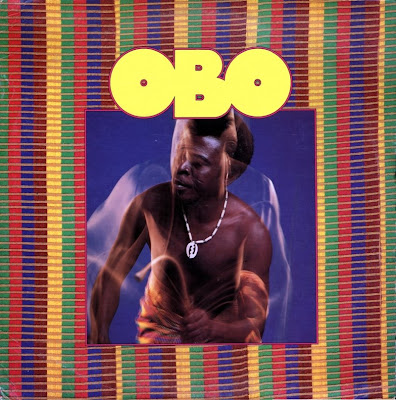OBO ADDY
Obo
1986
256+ VBR LAME mp3
Vinyl rip & scans from Avocet P-102
Our Ghana Soundz Outernational mini-series at Soundological concludes with this 1984 release by Ghanaian expat Obo Addy who has called Portland, Oregon home for at least 25 years. His story is thoroughly covered elsewhere, as he is still active in music despite a bout with cancer early this decade. After Eno's engineering of Edikanfo, we return stateside where we began with Guy Warren and this LP includes a cover of his song Africa Speaks, America Answers to take us full circle. Also notable for the trumpet work of another local Stumptowner, Tony Collins from one of my favourite funk combos Pleasure and Danny Schauffler who blew the sax solo on Nu Shooz' 80s classic I Can't Wait.
Obo Addy - Percussion, Vocals
Israel Annoh - Traps, Percussion, Vocals
Mark Bjorklund - Bass
Mike Denny - Guitar
Rich Halley - Tenor Sax
Amon Kotey - Tenor Sax
Tom Hill - Trombone
Thara Memory - Trumpet
Tony Collins - Trumpet
Jim Cheek - Trumpet
Danny Schauffler - Flute Solo
Tina Sandoval - Vocals
Brenda Phillips - Vocals
1 I Love My Drums
2 Don't Go
3 Africa Speaks, America Answers
4 Hama Fe Shikome
5 Feelings Of All
6 Awinada (Bakofa)
7 Homesick
8 We Say
AMG Bio
by Craig Harris
Mark Bjorklund - Bass
Mike Denny - Guitar
Rich Halley - Tenor Sax
Amon Kotey - Tenor Sax
Tom Hill - Trombone
Thara Memory - Trumpet
Tony Collins - Trumpet
Jim Cheek - Trumpet
Danny Schauffler - Flute Solo
Tina Sandoval - Vocals
Brenda Phillips - Vocals
1 I Love My Drums
2 Don't Go
3 Africa Speaks, America Answers
4 Hama Fe Shikome
5 Feelings Of All
6 Awinada (Bakofa)
7 Homesick
8 We Say
AMG Bio
by Craig Harris
The musical traditions of Ghana have been explored and extended by Ghana-born and Seattle-based drummer, composer and bandleader Obo Addy. Together with his world beat band, Kukrudu, and traditional quartet, Okropong, Addy continues to be one of Ghana's greatest musical ambassadors. A recipient of the prestigious national Heritage Fellowship Award by the National Endowment for the Arts, Addy has toured extensively through the United States, Europe, the Middle East and Australia. The son of a Wonche priest and medicine man, Addy was exposed, as a youngster, to the rituals and traditions of the Ga people of Ghana. This included the drumming, dancing and singing that accompanied his father's work. Addy has been playing music since earliest memory.
Although he began by playing bells at village rituals, he soon switched to the drums. Joining Joe Kelly's Band, at the age of eighteen, Addy learned to play and sing western pop music in theaters, hotels and night clubs in the capitol city of Accra. A year later, he joined the Builder's Brigade Band. In 1961, Addy joined the Farmers Council of Ghana, an organization dedicated to educating farmers through drama, music and cinema. The same year, Addy was inspired to present concerts of traditional music. The show, Edzo, was debuted at Accra Stadium.
In 1962, Addy became assistant leader of the Farmers Band and master drummer and leader of the group's traditional unit. He remained with the group until 1966. Leaving the Farmers Band, in 1966, Addy formed a band to perform popular music from around the globe at the Continental Hotel. Two years later, he accepted an invitation to join the Ghana Broadcasting Band. In 1969, Addy formed a band, Anasi Krumian Soundz, the group group to exclusively use traditional Ghanaian instruments including the giri (African xylophone), Atentenben (bamboo flute), Whi (whistle) and calabash (rattles). The group performed in clubs, theaters and embassies and worked for the American peace Corps and Canadian Voluntary Service. At the same time, Addy studied, taught and performed traditional music of the Ewe, Ashanti, Fanti, Dagomba, Nafana, Konkomba and Ga people at the Arts Council of Ghana.
The experience provided an opportunity to begin fusing traditional and contemporary African music. After touring in Israel, in June, 1972, with other members of the Arts Council, Addy formed a band, Oboade ("Ancient"), with his brothers. Following a successful performance at the Olympic Games in Munich, Germany, Addy and Oboade began touring worldwide. The group made their U.S. debut in 1973 at the invitation of the Cultural Enrichment Program of Washington to perform in state schools and universities.
Together with his brother, Yacub Addy, Addy moved to the United States in 1977 and formed a band, Ablade, with American musicians. Two years later, Addy began teaching private lessons and performed for six weeks in the Black Repertory Theater's production of "For Coloured Girls Who Have Considered Suicide When The Rainbow Is Enuf". Forming a new band, Kukrudu, in 1981, Addy and the band recorded two albums -- "Obo" in 1983 and "Obo Addy/Kukrudu" in 1984. In 1986, Addy recorded a traditional solo album, "Born In The Tradition" and a contemporary album, "African-American". The traditional and contemporary sides of Addy's musical persona continued to be explored in 1987. While Kukrudu performed at the Saskatoon, Calgary and Edmonton jazz festivals, Addy also assembled a four-piece group, Okropong, to focus on traditional music and dance.
In 1989, Addy developed a music and dance concert production that traced the history, culture and meaning of Highlife music in Ghana. Funded by the NEA, he toured with the production throughout California. Addy's composition, "Wawshisijay (Our Beginning)," was recorded by the Kronos Quartet and featured on their chart-topping 1992 album, Pieces of Africa. The same year, Addy's album, Let Me Play My Drums, which spent one month on the "Billboard World Music" chart. In 1994, Addy released a solo album, The Rhythm Of Which A Chief walks Gracefully and performed with the Charlestown Symphony String Quartet.
The following year, he performed three new compositions with the Kronos String Quartet in Seattle. Addy has taught African song, dance and drumming in schools, including The Cornish Institute and Lewis And Clark College, and has done residencies at African-American Centers in North Carolina, the Sweetwater Art Center in Sewickley, Pennsylvania, Washington State University in Pullman, Washington and Williams College in Williamstown, Massachusetts.There's not as much info on small Portland independent label Velocet outside of Rich Halley's website:
Avocet...was created by my friend Hal Lee who I've known since the mid-'70s. He was originallv a drummer and student of Dave Storrs who got interested in recording and used my basement to set up a small recording studio. He recorded my first record there and did Obo Addy's first record there, and decided to start a label for creative music. Later Hal moved the studio into his own building.This debut effort is actually pretty rare but not that expensive and pops up online for $10 - $25 fairly frequently but for now you can get it courtesy of Soundological HERE. (Link updated May 24, 2013)















8 comments:
very cool series! I've been diggin' them all.
Thanks also for being the first commenter on my embryonic little blog. As I'm sure you know, it's pretty exciting to discover that someone out there in cyberlandia is actually paying attention! I'll post more soon.
glad you're digging it! It was hard NOT to leave a comment, you're throwing down some superb tracks over there!
Hi, Great blog! I've added you to my reading list and look foward to future posts. I grew up in Portland and have fond memories of Obo Addy performing at my elementary school! Keep up the good work,
-morgan
www.soulspectrum.blogspot.com
Thanks Morgan!
My wife used to live in Portland. I knew Obo was in the Northwest but when I double-checked the address, I was surprised.
I asked her if she knew him and she said "who?" but when I said he was the Ghanaian drummer, she remembered him right away. :)
mai visto nei negozi!
ma dove trovi tutti questi bei dischi?
grazie di cuore per la condivisione
sono rari! si possono trovare su vinile a Gemm...
Hi! I don't know if you still keep your blog updated, but just in case, would you be kind enough to re-upload this gem? Lately I'm into Ghanaian stuff... Anyway, THANKS in advance!
@Rafaelian
I'm trying to keep links alive at this point
Updated today, dreadfully late but updated
Post a Comment